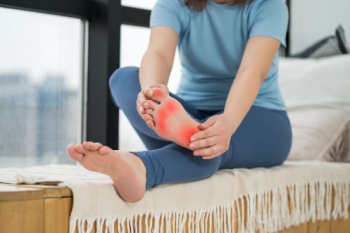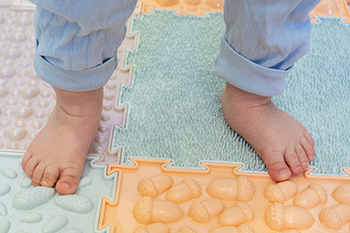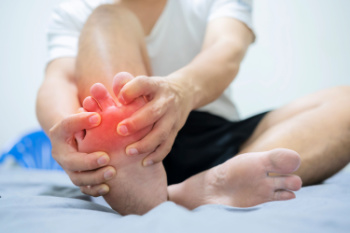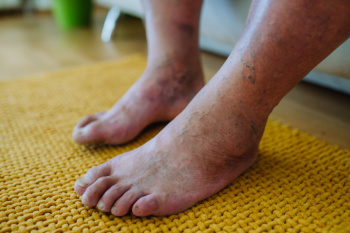Items filtered by date: April 2025
Relieving Heel Pain From Plantar Fasciitis

Plantar fasciitis is one of the most common causes of heel pain, often felt as a sharp or stabbing sensation with the first steps in the morning or after rest. It results from inflammation of the plantar fascia, the thick band of tissue that supports the arch and connects the heel to the toes. Diagnosis begins with a podiatrist reviewing your symptoms and medical history, followed by a physical exam to check for tenderness and tightness along the bottom of the foot. Imaging such as X-rays may be used to rule out other causes. Treatment typically includes rest, stretching exercises, wearing supportive footwear, or custom orthotics. In more persistent cases, targeted exercises, night splints, or anti-inflammatory treatments may be recommended. Addressing plantar fasciitis early helps prevent chronic pain or altered walking patterns. If heel pain is interfering with your daily life, it is suggested that you see a podiatrist.
Plantar fasciitis is a common foot condition that is often caused by a strain injury. If you are experiencing heel pain or symptoms of plantar fasciitis, contact Matthew McQuaid, DPM from Lake Mendocino Podiatry. Our doctor can provide the care you need to keep you pain-free and on your feet.
What Is Plantar Fasciitis?
Plantar fasciitis is one of the most common causes of heel pain. The plantar fascia is a ligament that connects your heel to the front of your foot. When this ligament becomes inflamed, plantar fasciitis is the result. If you have plantar fasciitis you will have a stabbing pain that usually occurs with your first steps in the morning. As the day progresses and you walk around more, this pain will start to disappear, but it will return after long periods of standing or sitting.
What Causes Plantar Fasciitis?
- Excessive running
- Having high arches in your feet
- Other foot issues such as flat feet
- Pregnancy (due to the sudden weight gain)
- Being on your feet very often
There are some risk factors that may make you more likely to develop plantar fasciitis compared to others. The condition most commonly affects adults between the ages of 40 and 60. It also tends to affect people who are obese because the extra pounds result in extra stress being placed on the plantar fascia.
Prevention
- Take good care of your feet – Wear shoes that have good arch support and heel cushioning.
- Maintain a healthy weight
- If you are a runner, alternate running with other sports that won’t cause heel pain
There are a variety of treatment options available for plantar fasciitis along with the pain that accompanies it. Additionally, physical therapy is a very important component in the treatment process. It is important that you meet with your podiatrist to determine which treatment option is best for you.
If you have any questions, please feel free to contact our offices located in Lakeport and Ukiah, CA . We offer the newest diagnostic and treatment technologies for all your foot care needs.
Why Live with Pain and Numbness in Your Feet?
Causes and Symptoms of Flat Feet in Children

Flat feet in children occur when the arches do not develop properly, leading to the entire sole making contact with the ground. Causes vary and may include hereditary factors, muscle imbalances, or joint flexibility issues. Low muscle tone can prevent proper arch formation, while high muscle tone may cause stiffness and discomfort. Hypermobile joints allow excessive movement, making it difficult for the arch to maintain structure. Obesity places added pressure on the feet, contributing to flattening over time. Symptoms include foot pain, fatigue, difficulty walking long distances, and inward rolling of the ankles. Some children may also experience balance issues or discomfort when standing for extended periods. If your child has symptoms of flat feet, it is suggested that you contact a podiatrist who can offer treatment and relief management tips.
Flatfoot is a condition many people suffer from. If you have flat feet, contact Matthew McQuaid, DPM from Lake Mendocino Podiatry. Our doctor will treat your foot and ankle needs.
What Are Flat Feet?
Flatfoot is a condition in which the arch of the foot is depressed and the sole of the foot is almost completely in contact with the ground. About 20-30% of the population generally has flat feet because their arches never formed during growth.
Conditions & Problems:
Having flat feet makes it difficult to run or walk because of the stress placed on the ankles.
Alignment – The general alignment of your legs can be disrupted, because the ankles move inward which can cause major discomfort.
Knees – If you have complications with your knees, flat feet can be a contributor to arthritis in that area.
Symptoms
- Pain around the heel or arch area
- Trouble standing on the tip toe
- Swelling around the inside of the ankle
- Flat look to one or both feet
- Having your shoes feel uneven when worn
Treatment
If you are experiencing pain and stress on the foot you may weaken the posterior tibial tendon, which runs around the inside of the ankle.
If you have any questions please feel free to contact our offices located in Lakeport and Ukiah, CA . We offer the newest diagnostic and treatment technologies for all your foot and ankle needs.
Why Your Toes Might Hurt and What to Do About It

Toe pain can make everyday activities uncomfortable, whether you are walking, running, or simply wearing shoes. Common causes include bunions, hammertoes, ingrown toenails, and arthritis. Repetitive stress from wearing tight shoes, high-impact activities, or foot deformities can also lead to inflammation and pain in the toes. If your toes are sore, swollen, or stiff, rest may provide temporary relief. Wearing shoes with a roomy toe box and good arch support can ease pressure on the joints. Stretching and strengthening exercises can improve flexibility and reduce discomfort. Persistent toe pain may signal a more serious problem, such as a stress fracture or nerve issue. If the pain does not improve or worsens, it is suggested that you see a podiatrist, who can diagnose the cause and recommend the right treatment.
Toe pain can disrupt your daily activities. If you have any concerns, contact Matthew McQuaid, DPM of Lake Mendocino Podiatry. Our doctor can provide the care you need to keep you pain-free and on your feet.
What Causes Toe Pain?
Most severe toe pain is caused due to a sports injury, trauma from dropping something heavy on the toe, or bumping into something rigid. Other problems can develop over time for various reasons.
Toe pain can be caused by one or more ailments. The most common include:
- Trauma
- Sports injury
- Wearing shoes that are too tight
- Arthritis
- Gout
- Corns and calluses
- Hammertoe
- Bunions
- Blisters
- Ingrown toenails
- Sprains
- Fractures (broken bones)
- Dislocations
When to See a Podiatrist
- Severe pain
- Persistent pain that lasts more than a week
- Signs of infection
- Continued swelling
- Pain that prevents walking
Diagnosis
In many cases the cause of toe pain is obvious, but in others, a podiatrist may want to use more advanced methods to determine the problem. These can range from simple visual inspections and sensation tests to X-rays and MRI scans. Prior medical history, family medical history, and any recent physical traumatic events will all be taken into consideration for a proper diagnosis.
Treatment
Treatments for toe pain and injuries vary and may include shoe inserts, padding, taping, medicines, injections, and in some cases, surgery. If you believe that you have broken a toe, please see a podiatrist as soon as possible.
If you have any questions please feel free to contact our offices located in Lakeport and Ukiah, CA . We offer the newest diagnostic tools and technology to treat your foot and ankle needs.
Protecting Your Feet if You Have Diabetes

If you have diabetes, taking care of your feet is essential. High blood sugar can damage nerves, causing numbness and reducing blood flow, making it harder for even small cuts or blisters to heal. This increases the risk of serious complications, including infections and ulcers, which can lead to limb loss, if not properly managed. Daily foot care is one of the best ways to prevent problems. Inspect your feet each day for cuts, redness, swelling, or signs of infection. Keep your feet clean, moisturized, and always wear shoes to protect against injury. Regular trimming of toenails, properly fitting footwear, and managing your blood sugar are also key to keeping your feet healthy. Even without symptoms, people with diabetes benefit from regular foot exams. If you are part of this population, it is suggested that you schedule an appointment with a podiatrist for a comprehensive foot evaluation and personalized care plan to help prevent complications.
Diabetic foot care is important in preventing foot ailments such as ulcers. If you are suffering from diabetes or have any other concerns about your feet, contact Matthew McQuaid, DPM from Lake Mendocino Podiatry. Our doctor can provide the care you need to keep you pain-free and on your feet.
Diabetic Foot Care
Diabetes affects millions of people every year. The condition can damage blood vessels in many parts of the body, especially the feet. Because of this, taking care of your feet is essential if you have diabetes, and having a podiatrist help monitor your foot health is highly recommended.
The Importance of Caring for Your Feet
- Routinely inspect your feet for bruises or sores.
- Wear socks that fit your feet comfortably.
- Wear comfortable shoes that provide adequate support.
Patients with diabetes should have their doctor monitor their blood levels, as blood sugar levels play such a huge role in diabetic care. Monitoring these levels on a regular basis is highly advised.
It is always best to inform your healthcare professional of any concerns you may have regarding your feet, especially for diabetic patients. Early treatment and routine foot examinations are keys to maintaining proper health, especially because severe complications can arise if proper treatment is not applied.
If you have any questions please feel free to contact our offices located in Lakeport and Ukiah, CA . We offer the newest diagnostic and treatment technologies for all your foot and ankle needs.

